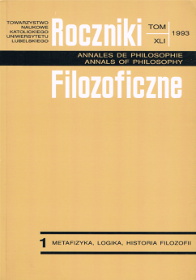On the Definition of Truth by Means of the Concept of a State of Affairs Described by a Proposition
Abstract
Taking into account my papers: (1) A Proof of the Equivalence of Two Formulations of the Classical Definition of Truth, (2) Supplementary Remarks to My Paper: A Proof of the Equivalence of Two Formulations of the Classical Definition of Truth and analyzing anew the objection presented at the beginning of the paper (2) we arrive at the following conclusions concerning the possibility of defining the concept of a true propositions by means of the concept of a state of affairs described by a proposition:
1. A more careful analysis of the objection presented at the beginning of the paper (2) shows that its conclusion stating that the states of affairs described by two different true propositions are identical does not follow from the statement about the identity of the states of affairs described by false propositions (which are equal to the empty set).
2. Hence we can accept that a state of affairs described by a proposition is:
a) a suitable relation restricted to a sequence of objects (conception presented in (1)),
or b) a determinant of such a relation (conception presented in (2)),
or c) a suitable relation restricted to a sequence of objects if a proposition is true or a determinant of such a relation if a proposition is false.
3. The standpoint a) is based on the intuitive assumption concerning states of affairs described by propositions but it has the consequence that all false propositions describe the same state of affairs. In this point there is a divergence between a natural language and the classical logical calculus and set theory which was discussed in the initial part of the paper (2).
Copyright (c) 1993 Roczniki Filozoficzne

This work is licensed under a Creative Commons Attribution-NonCommercial-NoDerivatives 4.0 International License.





